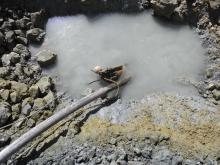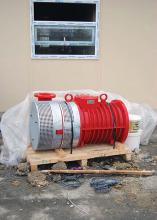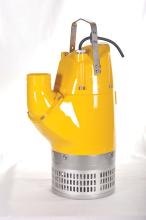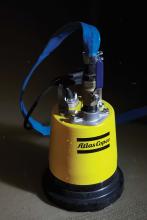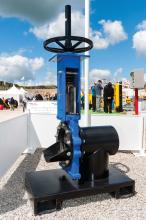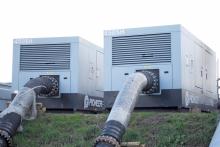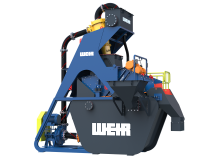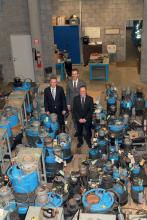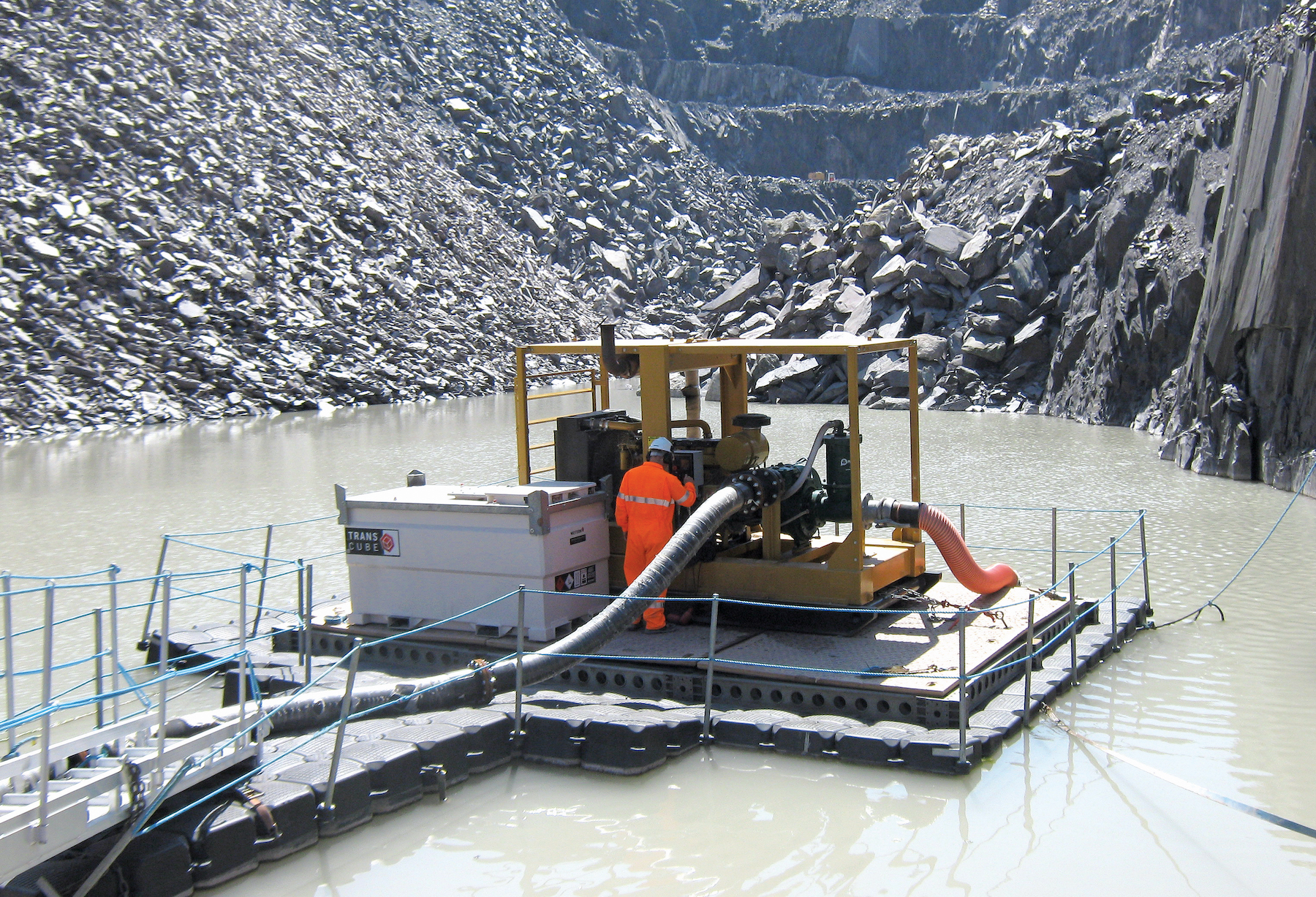
A new strategic research and development initiative in dewatering was launched at Bauma 2013, writes Jon Masters
The company behind the announcement was
The company says its Materials Matters R&D project will focus on four main criteria of reliability, longevity of wearing parts, ease of maintenance and fuel consumption in seeking more process efficiencies.
“High-level engineering and academic study are an important part of the R&D mix, but tackling all four of the criteria will only be possible through collaboration and communication between academics, engineers, designers and, arguably most importantly, those with site-level, practical experience,” says Tony G Locke, Weir Minerals Europe managing director.
The company has just launched the latest edition in its range of Warman centrifugal pumps, the DWU dewatering pump, to the European market, and has already captured its first order from German company Dorfner for its Hirschau mine near Regensburg.
The new pump is designed to deliver increased efficiency where water needs to be lifted over greater heights and the unit can deliver at heads of up to 140m. It can be configured in series to deliver even greater head heights.
Four sizes are available, with outlet diameters of 75mm, 125mm, 150mm and 200mm, while around 50% of the parts are interchangeable with Weir Minerals’ popular slurry pump, the Warman WBH.
“We have used the latest computer-modelling technology to achieve a hydraulic design that is optimised for the high-head, high-efficiency dewatering challenges most commonly encountered by our customers, while maintaining a proper robust mining type pump,” says Steve Sedgwick, Weir Minerals’ Europe product manager for mine dewatering.
Uwe Bär, project engineer for dewatering at Dorfner, says: “We have selected the system from Weir not only because of the excellent performance track record of the Warman slurry pumps we have used widely in the past, but also because of the availability of a complete integrated pumps and pontoon system which includes all of the necessary operator safety features.”
Weir Minerals is not alone in focusing closely on process efficiencies.
For instance, Selwood has now added a low emission engine, a Stage 111/Tier 4 Interim compliant
It is designed for use in large quarries and open cast mines, and supplements the company’s existing high-head pumps developed and introduced over the past two years.
The high-head pump range is Selwood’s first all-new pump line in 25 years, arriving with a promise of more efficiencies to come from smaller engines and reduced fuel consumption.
At Welsh Slate’s main site at Penrhyn, near Bangor, North Wales, a complete overhaul of the quarry’s pumping system has achieved increased production and reductions in operating costs and environmental impact.
Producing 85% of North Wales’ slate, the quarry has been beset by relatively “expensive and inefficient pumping,” and with the help of
A previous dewatering system operated using two high-head 90kw submersible pumps and two diesel generators mounted on pontoons with four 350m lengths of 6inch (15.24cm) and 8inch (20.3cm) hose, carrying water some 55m up out of the quarry. Leakage was a problem.
The pumps used more than 7,000litres/week and were costing the company almost £250,000 (€296,000). The operation was producing almost 1 million kg/CO2.
Pioneer’s scheme replaced the two submersible pumps with one 150 clear liquid medium head 112kw diesel pump, capable of pumping a minimum 100litres/second, mounted on a plastic pontoon with one fuel tank and 30m of 8inch wire armoured hose, while the existing hoses were renovated.
Even with a 68kw decrease in power, the new scheme has reduced Penrhyn’s weekly fuel consumption to 4,480litres and cut its annual fuel bill to £150,000 (€178,000). The operation’s carbon footprint reduced by 40%.
Ramirent, a leading European equipment rental company with 325 customer centres in 11 countries, has just purchased 50
Ramirent’s rental customers in Poland are mostly active in the construction and mining industries, and it has a successful history working with Atlas Copco, already using Atlas Copco compressors and generators in its rental fleet. In 2011 the Slovakian branch placed an order for WEDA pumps, and this proved a deciding factor in making the switch to WEDA pumps in Poland.
Abet Cantuba, product marketing manager pumps for Atlas Copco Portable Energy, explains that for Atlas Copco the role of preferred partner for rental companies is a deliberate one.
“There is no conflict of interest or competition, as we don’t rent pumps ourselves and have no plans to start doing so. We are seeing an increasing number of rental companies that consider this a key condition.”
Each pump will be delivered with a Storz discharge coupling; built-in float switch and an additional rope to prevent customers pulling out cables when manoeuvring the pump.
“Listening to your customers to understand their needs is key to building a long relationship with them,” says Michal Goral, sales manager Poland with Atlas Copco Portable Energy.
“With these customisations we are able to deliver the pumping solutions that meet Ramirent’s exact requirements.”
Atlas Copco Portable Energy has added new products to its WEDA range of portable pumps over the past year including the WEDA 04 and WEDA 08 drainage pumps; the WEDA 04B residual pump and the WEDA 08S sludge pump along with the latest addition, the WEDA 04S small submersible pump.
Swedish pump manufacturer
“We are continuously working to develop our solutions, whether that means changing a screw to simplify maintenance, or opting for a new casing for greater durability and overall performance,” says Jonas Bladh, Grindex technical engineer.
“Many of the changes in this latest generation of pumps are based on conversations with our customers and field engineers. We’ve listened to what they have to say and where an improvement could be made we’ve made it.”
Improved hard-wearing features of the updated Grindex pumps include new wear-resistant impellers for the Minex and Minette drainage pumps; a wear resistant coating of polyurethane for all sludge pumps and a polyurethane-option for Minor to Matador drainage pumps.
Meanwhile,
“The reliability and capability of the original Flygt BIBO dewatering pump is renowned within the industry and set the standard for submersible dewatering when it was first launched in the 1960s. Over one million of the original pumps have been sold since it was first brought to market. This celebrated design forms the core of this new generation of Flygt BIBO pumps that now includes the most advanced pumping technology, bringing the best in dewatering pump capability to the market,” says Daniel Westin, product manager at Xylem.
“Xylem’s new Flygt BIBO includes several innovations such as our DuraSpin hydraulic system for wear resistance; a new plug-in seal and a single impeller-adjustment screw.”
Xylem’s new Flygt BIBO is available in four models: 2830, 2840, 2860 and 2870, capable of handling flows of up to 100litres/second; heads up to 80m and solids up to 12mm in diameter.
Last word goes to Weir Minerals’ Tony Locke: “Innovations that lead to improvements in the practicality of the maintenance process will rarely originate from the desk of an engineer or designer. The thinking needs to be done working in concert with those people who actually work with the equipment day in, day out, and who understand where improvements might be made.
“Reliability requires effective working across many different disciplines. Sustained high-performance of components can only be guaranteed when the quality of materials and the accuracy of manufacturing processes are both assured, when the equipment is right for the application in question and when it is installed and configured correctly.
“Achieving this combination is not the responsibility of a single individual, but the result of correct decisions right along the line. It is this continuum which is at the heart of our Material Matters campaign.”

